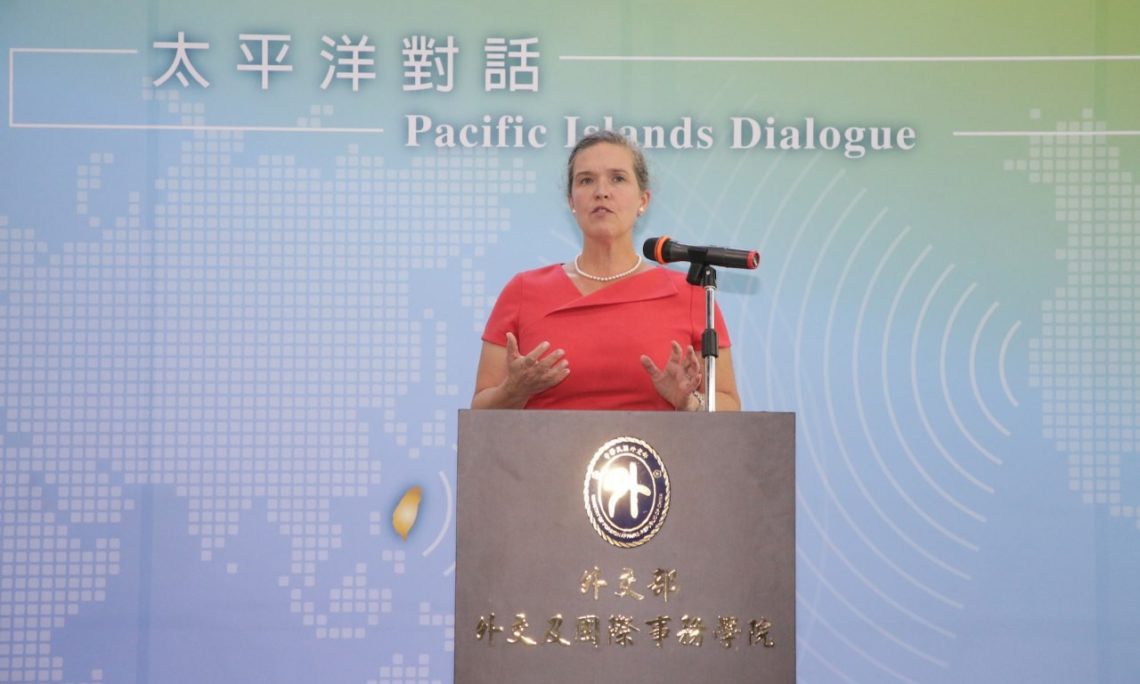OT-1973
October 7, 2019
Remarks by Sandra Oudkirk
U.S. Senior Official for APEC and Deputy Assistant Secretary for Australia, New Zealand, and the Pacific Islands
U.S.-Taiwan Pacific Islands Dialogue
October 7, 2019
Thank you very much. Foreign Minister Wu, Director Christensen, and esteemed ambassadors and representatives: It is my pleasure to be here today. I’m thrilled that on my first trip here as the new U.S. APEC Senior Official, I can also represent the State Department at this important dialogue—one which we hope will be the first of many.
The U.S. vision for the Indo-Pacific is very clear. We want to see a free and open Indo-Pacific. We want to build and deepen our relationships with nations across the region that share these values. We want to work together as partners, not as borrowers and lenders.
The three pillars of the Indo-Pacific Strategy are Economics, Governance, and Security. Economies must be open, transparent, and rules-based. We continually urge high standards and accountability because that is the path to long-term, sustainable, and inclusive economic growth.
We want to see our partners in the Pacific benefit from development activities. Development financing should not result in unsustainable debt. Recipients of financing and development assistance should be assured of their partners’ commitment to seeing all aspects of their societies flourish.
We also share an interest in ensuring that the Pacific Ocean remains free and open to maritime trade. And we are working together to increase the region’s resilience to natural disasters and a changing climate.
The United States is a Pacific nation. We continue to deepen our longstanding commitment to the prosperity and well-being of the people living in the Pacific, with whom we share many values, including a love of freedom.
This commitment to the Pacific starts at the very top with President Trump. He hosted the leaders of the Federated States of Micronesia, the Republic of the Marshall Islands, and Palau this May. This was the first time ever that a U.S. president has hosted the three leaders of Freely Associated States at the White House, and it was a fantastic meeting.
Secretary Pompeo visited the Federated States of Micronesia in August, another historic first. And I am here today representing President Trump and Secretary Pompeo to kick off this inaugural dialogue. We have been partners with the Pacific since World War II, and we are in the Pacific to stay.
On September 27, Secretary Pompeo announced $65 million in new assistance at a meeting with Pacific Island leaders in New York on the margins of the UN General Assembly. Under the Pacific Pledge of the Indo-Pacific Strategy, the U.S. Government is committing over $100 million in new U.S. assistance to the region.
This new assistance includes support for coral reef conservation, weather observation and data collection to increase preparedness for natural disasters, improved digital connectivity, and capacity-building to combat illegal, unreported, and unregulated fishing. USAID—who is also represented at this dialogue today—is expanding programming as well as the number of personnel it has assigned in the Pacific.
Taiwan has incredible capabilities in the areas I just mentioned. The United States and Taiwan have a long history of cooperation in responding to natural disasters as Director Christensen just mentioned, protecting the environment, and strengthening rule of law. And now we are looking at how to expand that cooperation to the Pacific Islands.
These pressing issues that the globe faces can only be overcome by working together. The United States has always emphasized how much Taiwan contributes to its diplomatic partners, its neighbors, and to the international community. Taiwan is a reliable partner and responsible stakeholder.
Taiwan is a force for good in the Pacific, and in the world. That is why we firmly support Taiwan’s relationships with Pacific Island nations. We have a shared vision for the region—one that includes rule of law, prosperity, and security for all. We want to explore how we can join Taiwan in advancing this vision for an Indo-Pacific that is free, open, and thriving.
I look forward to engaging today and over the next few days with Taiwan and our like-minded friends and partners from the Pacific Islands and elsewhere.
Thank you.
















![Video Thumbnail [Recovered]-01](../wp-content/uploads/sites/269/Video-Thumbnail-Recovered-01-1-750x450.jpg)






